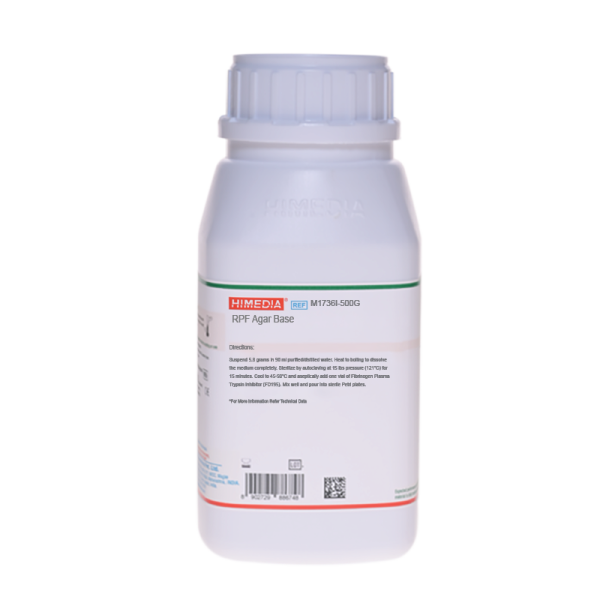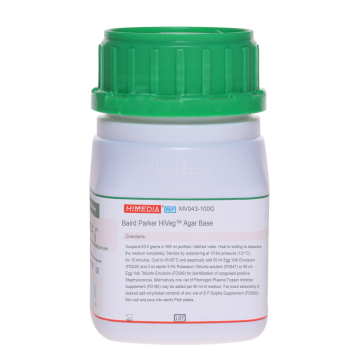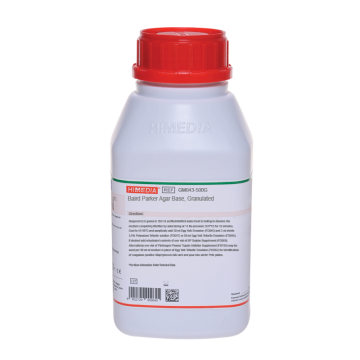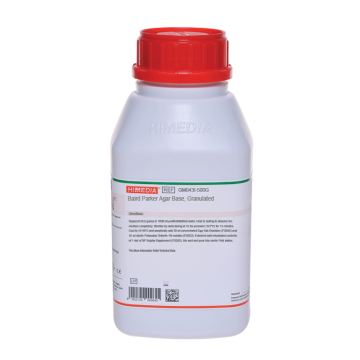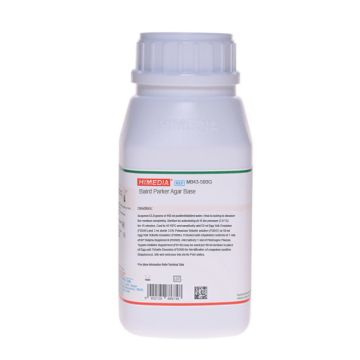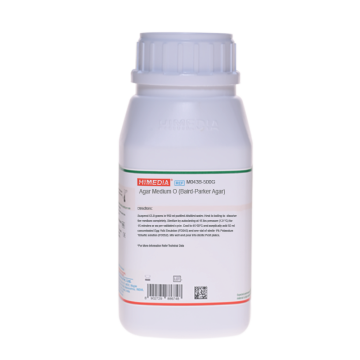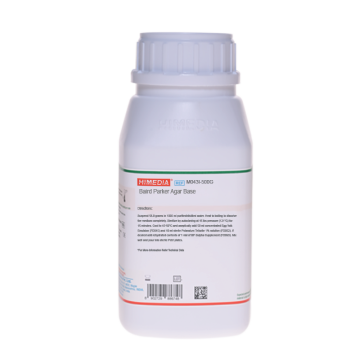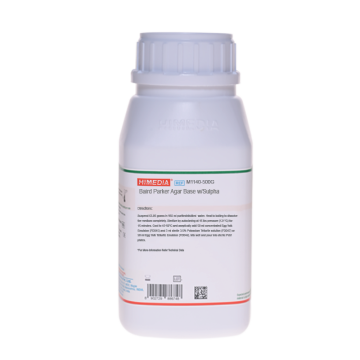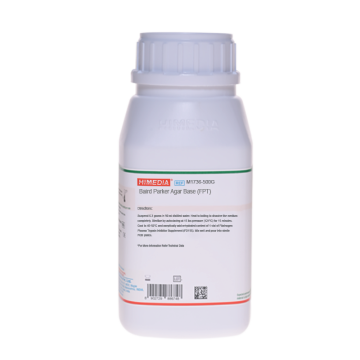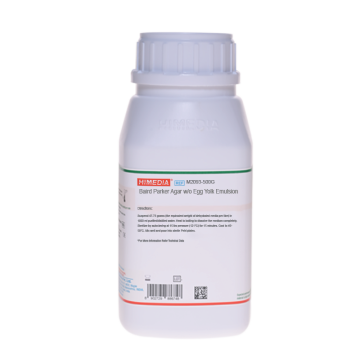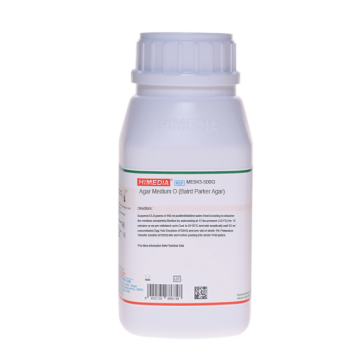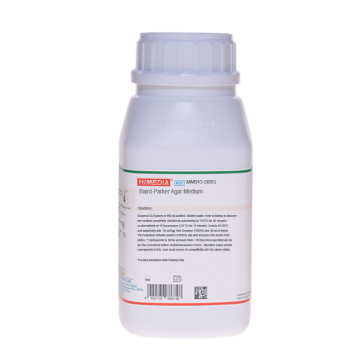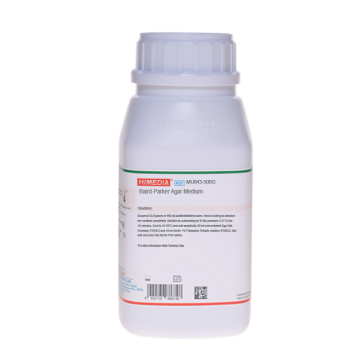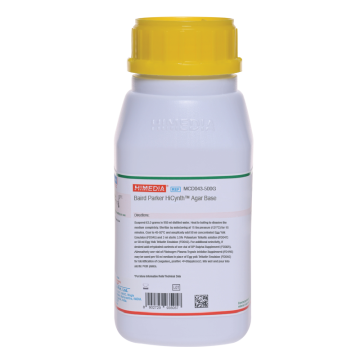 Your enquiry has been submitted
Your enquiry has been submitted
RPF Agar Base
Intended Use
Recommended for the enumeration of coagulase positive Staphylococci from food and animal feeding stuffs. The composition and performance criteria are in accordance with ISO 6888-2:1999/ Amd 2:2018 and 11133:2014 (E). Amd.:2020 .
Composition
RPF Agar Base
| Ingredients | g / L |
|---|---|
| Tryptone # | 10.000 |
| HM extract ## | 5.000 |
| Yeast extract | 1.000 |
| Glycine | 12.000 |
| Sodium pyruvate | 10.000 |
| Lithium chloride | 5.000 |
| Agar | 15.000 |
Final pH ( at 25°C) 7.2±0.2
**Formula adjusted, standardized to suit performance parameters
# Equivalent to Pancreatic digest of casein ## Equivalent to Meat extract
FPT Inhibitor (FD195) per vial for 90ml of medium
| Ingredients | Amount |
|---|---|
| Bovine fibrinogen | 0.375g |
| Rabbit plasma | 2.5 ml |
| Trypsin inhibitor | 2.5 mg |
| Potassium tellurite | 2.5 mg |
Directions
Suspend 5.80 grams in 90 ml purified/distilled water. Heat to boiling to dissolve the medium completely. Sterilize by autoclaving at 15 lbs pressure (121°C) for 15 minutes. Cool to 45-50°C and aseptically add one vial of FPT Inhibitor (FD195). Mix well and pour into sterile Petri plates.
Principle And Interpretation
Rabbit Plasma Fibrinogen Agar Base works on same principle as Baird Parker Agar with addition of Fibrinogen Plasma together with Trypsin and Potassium Tellurite as single supplement. Baird Parker Agar was developed by Baird Parker (1,2) from the Tellurite-glycine formulation of Zebovitz et al (3) for isolation and enumeration of Staphylococci in food and other material since it allows a good differentiation of coagulase positive strains. The composition laid down is as per ISO 6888-1 (4) and testing as per ISO 11133:2014 (5). Studies show that almost 100% of coagulase positive Staphylococci are capable of reducing tellurite, which produces black colonies, whereas other Staphylococci cannot always do so.
Tryptone, HM extract and yeast extract are sources of nitrogen, carbon, sulphur and vitamins. Sodium pyruvate not only protects injured cells and helps recovery but also stimulates Staphylococcus aureus growth destroying selectivity. Lithium chloride and potassium tellurite inhibit most of the contaminating microflora except Staphylococcus aureus. The tellurite imparts a black colour to the colonies. Glycine, pyruvate enhances growth of Staphylococcus. FPT Inhibitor allows detection of coagulase activity. A opacity halo and grey-black colonies on this medium are diagnostic for coagulase positive Staphylococci.
Type of specimen
Food samples and animal feeding stuffs
Specimen Collection and Handling
For food samples, follow appropriate techniques for sample collection and processing as per guidelines (4,5). After use, contaminated materials must be sterilized by autoclaving before discarding.
Warning and Precautions
Read the label before opening the container. Wear protective gloves/protective clothing/eye protection/face protection. Follow good microbiological lab practices while handling specimens and culture. Standard precautions as per established guidelines should be followed while handling specimens. Safety guidelines may be referred in individual safety data sheets.
Limitations
- Individual organisms differ in their growth requirement and may show variable growth patterns on the medium.
- Each lot of the medium has been tested with the standard strains, slight variationin growth may be observed depending on the source from where the organism has been isolated.
- It should be noted, however, that bovine strains, in particular, do not always produce this zone and confirmatory testing is needed.
Performance and Evaluation
Performance of the medium is expected when used as per the direction on the label within the expiry period when stored at recommended temperature.
Quality Control
Appearance Cream to yellow homogeneous free flowing powder
Gelling Firm, comparable with 1.5% agar gel.
Colour and Clarity of prepared medium Yellow coloured clear to slightly opalescent gel forms in Petri plates..
Reaction Reaction of 5.8% w/v aqueous solution at 25°C. pH : 7.2±0.2
pH 7.00-7.40
Cultural Response
Productivity : Cultural response was observed with added FPT Inhibitor (FD195) after an incubation at 35± 1°C for 24 ± 2 to 48 ± 2 hours. Recovery rate is considered as 100% for bacteria growth on Reference medium - Soyabean Casein Digest Agar.
Specificity : Cultural response was observed with added FPT Inhibitor (FD195) after an incubation at 35± 1°C for 24 ± 2 to 48 ± 2 hours.
Selectivity : Cultural response was observed with added FPT Inhibitor (FD195) after an incubation at 35± 1°C for 48 ± 2 hours.
| Organism | Inoculum (CFU) | Growth | Recovery | Characteristic reaction |
|---|---|---|---|---|
| Productivity | ||||
| Staphylococcus aureus subsp. aureus ATCC 6538 (00032*) | 50 -100 | luxuriant | >=50 % | Black or grey colonies with opacity halo |
| Staphylococcus aureus subsp. aureus ATCC 25923 (00034*) | 50 -100 | luxuriant | >=50 % | Black or grey colonies with opacity halo |
| Selectivity | ||||
| Escherichia coli ATCC 8739 (00012*) | >=104 | inhibited | ||
| Escherichia coli ATCC 25922 (00013*) | >=104 | inhibited | ||
| Specificity | ||||
| Staphylococcus epidermidis ATCC 12228 (00036*) | 103-104 | growth | Black or grey colonies without opacity halo | |
| Staphylococcus saprophyticus ATCC 15305 (00159*) | 103-104 | growth | Black or grey colonies without opacity halo | |
Key : (*) - Corresponding WDCM numbers
Storage and Shelf Life
Store between 10-30°C in a tightly closed container and the prepared medium at 2-8°C. Use before expiry date on the label. On opening, product should be properly stored dry, after tightly capping the bottle in order to prevent lump formation due to the hygroscopic nature of the product. Improper storage of the product may lead to lump formation. Store in dry ventilated area protected from extremes of temperature and sources of ignition. Seal the container tightly after use. Product performance is best if used within stated expiry period.
Disposal
User must ensure safe disposal by autoclaving and/or incineration of used or unusable preparations of this product. Follow established laboratory procedures in disposing of infectious materials and material that comes into contact with sample must be decontaminated and disposed of in accordance with current laboratory techniques (6,7).
Reference
- Baird-Parker A. C., 1962, J. Appl. Bacteriol., 25:12.
- Baird-Parker A. C. and Davenport E., 1965, J. Appl. Bacteriol., 28:390.
- Zebovitz E., Evans J. B. and Niven C.F., 1955, J. Bacteriol., 70:686 .
- Microbiology of food and animal feeding stuffs - Horizontal method for the enumeration of coagulase positive Staphylococci (Staphylococcus aureus and other species). International Organization for Standardization (ISO), 1999 Ammd 2:2018-07, Draft ISO/DIS 6888-1.
- Microbiology of food,animal feeding stuffs and water- Preparation, production,storage and performance culture media, EN ISO 11133:2014 (E). / Amd.:2020
- Isenberg, H.D. Clinical Microbiology Procedures Handbook 2nd Edition.
- Jorgensen, J.H., Pfaller, M.A., Carroll, K.C., Funke, G., Landry, M.L., Richter, S.S and Warnock., D.W. (2015) Manual of Clinical Microbiology, 11th Edition. Vol. 1.
| Product Name | RPF Agar Base |
|---|---|
| SKU | M1736I |
| Product Type | Regular |
| Physical Form | Powder |
| Origin | Animal |
| Packaging type | HDPE |
| References | 1.Baird-Parker A. C., 1962, J. Appl. Bacteriol., 25:12.2.Baird-Parker A. C. and Davenport E., 1965, J. Appl. Bacteriol., 28:390. 3.Beckers N. J. et al, 1984, Can. J. Microbiol., 30:470. 4.Microbiology of food and animal feeding stuffs - Horizontal method for the enumeration of coagulase positive Staphylococci (Staphylococcus aureus and other species). International Organization for Standardization (ISO), 1999 Ammd 2003, Draft ISO/DIS 6888-1. |
| Customized Product Available | No |



